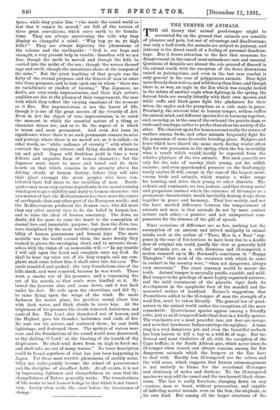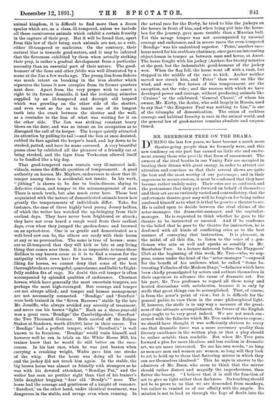THE TEMPER OF ANIMALS.
THE old theory that animal good-temper might be accounted for on the ground that animals are sensible of pleasure and pain, but not of advantage and disadvantage, was only a half-truth, for animals are subject to jealousy, and jealousy is the direct result of a feeling of personal disadvan- tage. But it draws attention to the fact that occasions for disagreement in the case of most animals are rare and unusual. Questions of domicile are almost the sole ground of discord in the animal world, with the exception of the fierce dissensions raised at pairing-time, and even in the last case combat is only general in the case of polygamous animals. Deer fight more fiercely than wolves, and wild sheep than lions; and though there is, or was, an eagle in the Zoo which was caught locked in the talons of another eagle when fighting in the spring, the fiercest birds are usually friendly with their own species, and while ruffs and black-game fight like gladiators for their wives, the eagles and the peregrines as a rule mate in peace. Proximity, the severest trial to human temper, seldom ruffles the animal mind, and different species live in harmony together, each seeming, as in the case of the owls and the prairie-dogs, or rooks and starlings, rather to prefer than shun the society of the other. The choicest spots for homes are naturally the source of warfare among birds, and other animals frequently fight for the possession of some favourite breeding-place. Badgers and foxes which have shared the same earth during winter often fight for sole possession in the spring, when the fox invariably wins, a result which would) hardly be expected from the relative physique of the two animals. But such quarrels are only for the sake of rearing :their young, not for selfish reasons ; and even apprehended pressure on the food-supply rarely excites ill-will, except in the case of the largest carni- vorous birds and animals, which require a wider range for hunting, and drive their young to other districts. The rodents and ruminants are less jealous ; and that strong social and gregarious instinct which the existence of ill-temper as a permanent characteristic would inevitably destroy, keeps them together in peace and harmony. They love society, and not the least marked difference between the temperament of animals and men, is that animals do not by mere contact irritate each other,—a positive and not unimportant com- pensation for the absence of the gift of speech.
Since occasions of difference are so few, nothing but the assumption of an ancient and inbred malignity in animal minds, such as the author of "Three Men in a Boat" sup- poses in the case of fox-terriers to have been due to a double dose of original sin, could justify the view so generally held that animals are, as a rule, ferocious and ill-tempered, a notion summed up in Mr. Burnand's conclusion in "Happy Thoughts," that most of the creatures with which he came in contact in the country were, "when not dangerous, always very uncertain." The exact contrary would be nearer the truth. Animal temper is naturally pacific, equable, and mild. Bad temper is the privilege of more highly organised natures ; and the mild resentment of the placable tiger finds its development in the apoplectic fury of the mandril and the measured malice of mankind. Horace's suggestion, that Prometheus added to the ill-temper of man the strength of a mad lion, must be taken literally. The general law of good- nature in the animal world makes the. exceptions all the more remarkable. Quarrelsome species appear among a friendly tribe, just as an ill-tempered individual does in a kindly species. The ruminants are a most peaceful race, yet deer are savage, and so is that handsome Indian antelope the nylghau. A tame stag is a very dangerous pet, and even the beautiful roebuck has been known to kill a boy in a wild fit of rage. But the fiercest and most vindictive of all, with the exception of the Cape buffalo, is the South African gnu, which never loses its ill-temper when tamed, and always remains among the few dangerous animals which the keepers at the Zoo have to deal with. Hardly less ill-tempered are the zebras and the wild asses, which suggests that human mismanagement is not entirely to blame for the occasional ill-temper and obstinacy of mules and donkeys. To the ill-tempered species we may add the camel and the two-horned black rhino. ceros. The last is really ferocious, charging down on any creature, man or beast, without provocation, and capable of inflicting mortal wounds even on the lion, the elephant, or its own kind. But among all the larger creatures of the
animal kingdom, it is difficult to find more than a dozen species which are, as a class, ill-tempered, unless we include all those carnivorous animals which exhibit a certain ferocity in the capture of their prey. But it will be found that, apart from this law of their being, such animals are not, as a rule, -either ill-tempered or malicious. On the contrary, their natural bias is towards good-nature, and it may be inferred that the fierceness exhibited by them when actually striking their prey, is rather a gradual development from a particular necessity than an essential part of their nature. The good- humour of the lions and other felidm was well illustrated by a scene at the Zoo a few weeks ago. The young lion from Sokoto was much intent on breaking in the iron shutter which separates the house it now occupies from its former quarters next door. Apart from the very proper wish to assert a right to its former domicile, it had the irritating stimulus supplied by an ill-tempered and decrepit old leopard which was growling on the other side of the shutter, and even went so far as to insert one of its longest teeth into the crack between the shutter and the wall, as a reminder to the lion of what was waiting for it on the other side. The lion was striking constant heavy blows on the door, and was so intent on its occupation as to disregard the call of its keeper. The keeper quietly attracted its attention by pulling its tail !—and the lion at once desisted, rubbed its face against the keeper's hand, and lay down to be stroked, patted, and have its mane caressed. A very beautiful ,puma close by exhibited all the pleasure of a friendly cat at being stroked, and the tiger from Turkestan allowed itself to be fondled like a big dog.
That good-tempered races contain very ill-natured indi- -viduals, raises the difficult question of temperament. A good authority on horses, Mr. Mayhew, endeavours to show that ill- temper among them is accidental, not innate. In his work, ." jibbing" is shown to be due to brain-disease, shying to -defeative vision, and temper to the mismanagement of man. There is much truth, but also much error here. Those best acquainted with the nature of domesticated animals know how -greatly the temperaments of individuals differ. Take, for instance, the case of three highly bred young Jersey heifers, -of which the writer has watched the up-bringing from their earliest days. They have never been frightened or struck; they have not even heard a rough word from their earliest days, even when they jumped the garden-fence and browsed -on an apricot-tree. One is as gentle and domesticated as a -well-bred cow can be, the others are ready with their horns at any or no provocation. The same is true of horses : some are so ill-tempered that they will kick or bite at any living thing that comes near them. It is as impossible to trace these -dislikes to any known cause as it is to find a reason for the antipathy which cows have for hares. However great our diking for horses, we cannot deny that some of the best thoroughbreds are revengeful, quarrelsome, and liable to fright- fully sudden fits of rage. No doubt this evil temper is often :accompanied by splendid qualities of endurance. Chestnut horses, which have generally the most uncertain tempers, are perhaps the most high-couraged. But courage and temper .are not always allied; and temper and human management
are not necessarily connected. Bendigo ' and Snrefoot ' were both trained in the "Seven Barrows" stable by the late Mr. Jousiffe, who always avoided any severity of treatment, and never ran his horses "light." Each as a three-year-old won a great race, Bendigo ' the Cambridgeshire, Surefoot ' the Two Thousand Guineas. Both carried off the Eclipse Stakes at Sandown, worth 210,000, later in their career. Yet Bendigo ' had a perfect temper, while Surefoot's ' is well known to be ferocious. Bendigo' would train himself, and however well he ran in trials on the White Horse Hill, his trainer knew that he would do still better on the race- -course. In his last race, when he was just beaten when -carrying a crushing weight, Watts gave him one stroke -of the whip. But the horse was doing all he could, and the jockey did not touch him again. In the stable, the big brown horse was almost as friendly with strangers as he was with his devoted attendant, "Bendigo Pat," and the writer has seen no prettier sight than that of his trainer's little daughter hugging "dear old Bendy's ' " nose. The horse had the courage and gentleness of a knight of romance. Surefoot,' on the other hand, under identical treatment, was dangerous in the stable, and savage even when running. In the actual race for the Derby, he tried to bite the jockeys on the horses in front of him, and when being put into the horse- box for the journey, gave more trouble than a Murcian bull. Yet this savage temper was not accompanied by unusual courage and endurance, and in severe races the even-tempered
Bendigo ' was his undoubted superior. Peter,' another race- horse noted for his stubborn obstinacy, once gave an interesting object-lesson in temper as between man and horse, at Ascot. The horse fought with his jockey (Archer) for twenty minutes at the post, but the indomitable good-humour of the jockey won. When the flag fell, the horse went off with a rush, but stopped in the middle of the race to kick. Archer neither moved nor struck him, and Peter' then went on like the wind, and won ! But horses of this temperament are the exception, not the rule ; and the success with which we have developed power and courage, without producing animals like 'Cruiser' or the celebrated General Chasse,' of whom his owner, Mr. Kirby, the dealer, who sold largely in Russia, used to say that "the Emperor Paul was nothing to him," is one of the triumphs of domestication. The union of reckless courage and habitual ferocity is rare in the animal world, and the general law of good-natnre remains absolute and unques- tioned.











































 Previous page
Previous page